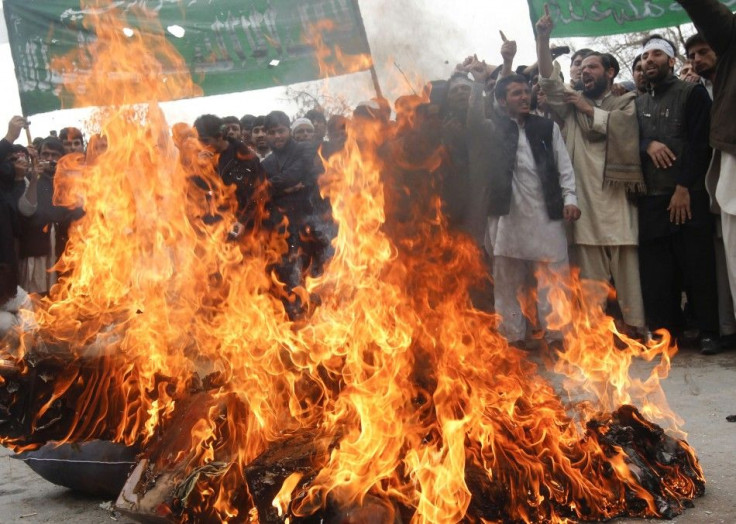US Soldier Accused of Killing Spree Flown Out of Afghanistan

(Reuters) - A US soldier accused of shooting dead 16 Afghan civilians has been flown out of Afghanistan, officials said, as Washington attempted to calm seething anger over a massacre that raised serious questions about the West's war strategy.
Amid mounting tensions in Afghanistan over the unnamed soldier's gun rampage, an Afghan man in a stolen pickup truck sped onto the airport runway as a plane carrying US Defence Secretary Leon Panetta was about to land - an extraordinary security breach.
No one on board the military plane carrying Panetta was hurt when it landed at a British base in Helmand province. Defence officials played down the incident, saying the Pentagon chief was never in danger.
The pickup truck crashed into a ditch after it sped across the runway ramp and the driver, whose motives were unclear, emerged from the vehicle in flames.
He was being treated for burns, a Pentagon spokesman said, and a member of the Nato-led coalition was also hurt when the vehicle was stolen.
Panetta arrived for his unannounced visit three days after the massacre in neighboring Kandahar province. Although Panetta's trip was planned before the shooting, it comes as Afghan civilians and lawmakers alike demand answers.
Foremost among those demands is that the soldier responsible be tried in Afghanistan over the shooting, one of the worst of its kind since US-backed Afghan forces toppled the Taliban in 2001 for harbouring the al Qaeda masterminds of the September 11 attacks on the United States.
Despite those calls, the US staff sergeant who gave himself up after the villagers, including nine children and three women, were killed has been flown out of Afghanistan, the Pentagon said on Wednesday.
The New York Times, citing an unidentified senior US official, said the soldier had been flown to Kuwait. CNN also reported the sergeant had been taken there.
The commander of US and Afghan forces in Afghanistan, General John Allen, made the decision based on a legal recommendation, a US official said.
Afghan President Hamid Karzai's office was understood to have accepted that the soldier be tried in a US court, provided the process was transparent and open to media.
Panetta, the most senior US official to visit Afghanistan since the massacre, told US troops it must not deter them from their mission to secure the country ahead of the 2014 Nato deadline for the withdrawal of foreign combat troops.
We'll be challenged by our enemy. We'll be challenged by ourselves. We'll be challenged by the hell of war itself. But none of that, none of that, must ever deter us from the mission that we must achieve, Panetta told soldiers at Camp Leatherneck, the main US Marine base in Helmand.
US and other foreign soldiers listening to Panetta had been asked to leave their weapons outside, a highly unusual move that was downplayed as a gesture to Afghan troops who were unarmed during the address.
Tensions have risen sharply across Afghanistan since the attack and the inadvertent burning of copies of the Koran at the main Nato base last month, adding urgency to Panetta's visit. Panetta was to hold talks with Karzai and other Afghan leaders.
The Afghan Taliban threatened to retaliate for Sunday's shooting by beheading US personnel, while insurgents also attacked investigating Afghan officials on Tuesday.
BOMB ATTACKS, PROTEST
US soldiers are likely to be among those targeted, although other Westerners have also been attacked after similar incidents and Afghan civilians invariably bear the brunt of any upsurge in violence.
Earlier on Wednesday, a motorcycle bomb blast in Kandahar city - the capital of Kandahar province, where the Panjwai village shootings happened - killed an Afghan intelligence soldier.
A roadside bomb also killed eight civilians in Helmand.
On Tuesday, some 2,000 demonstrators chanting Death to America demanded Karzai reject a planned strategic pact that would allow US advisers and possibly special forces to remain beyond 2014.
In Washington, President Barack Obama said after meeting British Prime Minister David Cameron he did not anticipate any sudden change in plans for the pace of withdrawing troops.
Obama described the Kandahar massacre as tragic but emphasized at a briefing with Cameron that both nations remained committed to completing the Afghan mission responsibly.
In terms of pace, I don't anticipate at this stage that we're going to be making any sudden additional changes to the plan that we currently have, Obama said.
Nato leaders gathering in Obama's home city of Chicago on May 20-21 will decide the next phase of the planned transition to Afghan forces, which is already under way.
The United States and Britain have the largest contingents of foreign troops in Afghanistan, but domestic support for the war has flagged, posing a challenge to Obama as he campaigns for re-election on November 6.
Obama acknowledged that people wanted the war over, but argued they still back the reason for troops being there.
In a Reuters/Ipsos poll, 40 per cent of Americans said the shooting had weakened their support for the war.
As many as 61 of Americans surveyed in the March 12-13 poll said remaining US troops should be brought home immediately, down slightly from the 66 percent with that opinion in an earlier March poll. Seventeen percent disagreed.
The US military hopes to withdraw about 23,000 soldiers from Afghanistan by the end of the coming summer fighting season, leaving about 68,000.
In the two Panjwai district villages where the massacre took place, US troops remain confined to the compound where the accused soldier was based.
With its mission facing growing protests, Nato said on Wednesday it planned to boost security measures for its troops, measures reached in part after the January killing of four French soldiers by a rogue Afghan soldier.
© Copyright Thomson Reuters 2024. All rights reserved.




















